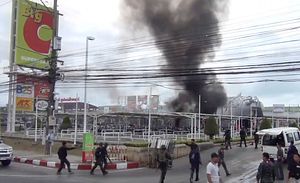Last week, we saw a new double explosive attack take place in southern Thailand, just weeks after another round of revived talks between the government and separatists in a long-running insurgency. The attack spotlighted the ongoing challenge of trying to bring an end to the violence in what remains one of Asia’s deadliest ongoing conflicts.
There has been little progress so far in ending a new wave of violence in Thailand’s Malay-Muslim majority southernmost provinces that has left over 7,000 dead since 2004. From the beginning of 2020 the Thai government has been participating in a new phase of direct peace talks with southern rebels, with the second round of direct peace negotiations being held in the Malaysian capital of Kuala Lumpur in early March. As I noted recently, while these talks may hold promise, there are also significant challenges that remain and it is unclear if both sides can eventually make the tough compromises needed to get to a lasting solution.
Last week, the challenge of seeking a solution to the southern Thailand insurgency was in the headlines again with a new attack. Insurgents attacked the office of the Southern Border Provinces Administration Center (SBPAC) – an intergovernmental agency that coordinates policy in southern Thailand – in the capital of Yala province, wounding at least 20 people. No group has officially admitted responsibility for the attack.
The attack itself comes as no surprise. While this is the first known successful targeting of the SBPAC, such double explosive device attacks – where an initial attack is designed to draw more individuals to a site before another one is conducted to inflict more casualties – have long been deployed in southern Thailand, including by the Barisan Revolusi Nasional (BRN) separatist group, which had been previously excluded from negotiations and recently included in revived talks. Such attacks have also taken place in the midst of negotiations previously as well, showcasing either discontent with the state of talks or command and control issues within insurgent groups.
The development demonstrates the risk of spoilers on either side disrupting any progress that may be made in southern Thailand insurgency peace talks. That risk remains real even amid the rise of other broader challenges, including Thailand’s coronavirus challenge, which a meeting at SBPAC was purportedly intended to address.
To be sure, this should not distract from the broader challenge of getting to peace amid decades of insurgency in southern Thailand. But it does serve as yet another reminder of how difficult it is to get to a resolution to this issue in spite of efforts being made by both sides.
































